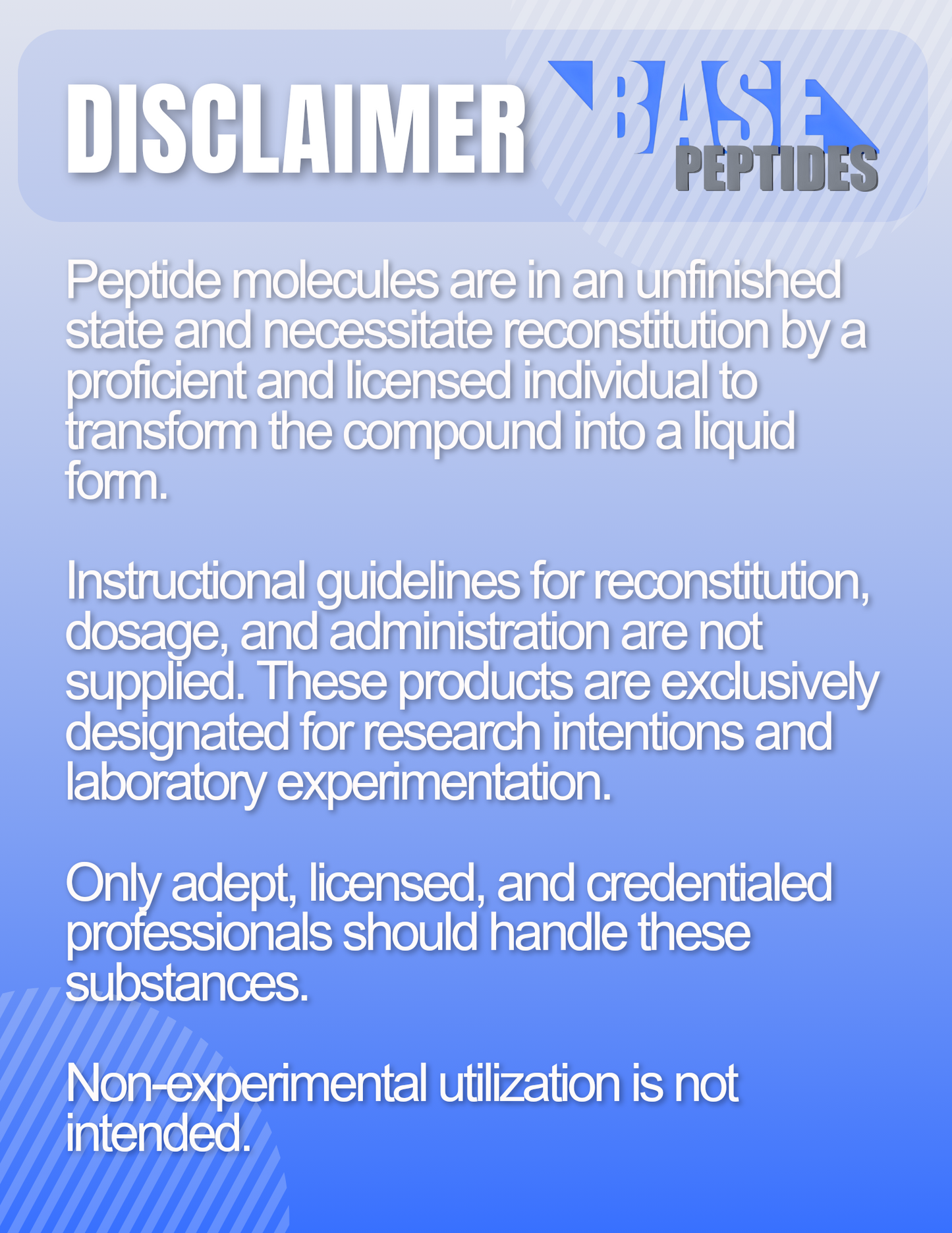Retatrutide
Retatrutide
Base Peptides are intended for licensed medical professionals and experienced researchers. Reconstitution required. Dosing and use instructions are not provided.
Couldn't load pickup availability
Retatrutide (LY-3437943) — Triple Agonist Peptide (GLP-1 / GIP / Glucagon Receptors)
Retatrutide is an investigational synthetic peptide engineered to activate three key hormone receptors — GLP‑1 Receptor, GIP Receptor (gastric-inhibitory polypeptide), and the Glucagon Receptor. It is studied for its potent effects on appetite regulation, energy expenditure, and metabolic-health outcomes in obesity and type 2 diabetes.
- Development code: LY-3437943
- CAS (various): 2381089-83-2
- Mechanism: GLP-1R agonist (EC₅₀ ~0.775 nM), GIPR agonist (EC₅₀ ~0.064 nM), GCGR agonist (EC₅₀ ~5.79 nM)
- Half-life: ~6 days in some models [oai_citation:3‡NovoPro Labs]
- By activating GLP-1 and GIP receptors, it boosts insulin secretion, enhances satiety (feeling full), and lowers blood sugar.
- By also activating the glucagon receptor, it increases energy expenditure (i.e., the body burns more fuel), and may reduce fat stores.
- The combined “triple-agonist” action is hypothesized to provide greater weight-loss and metabolic benefit than single or dual-agonist peptides.
- To explore next-generation metabolic peptide therapeutics beyond classic GLP-1 analogues.
- To study weight-loss mechanisms: appetite suppression + increased energy expenditure + fat-burning. -
- To model body-composition changes (fat mass, lean mass) in obese or overweight populations and complex metabolic disease.
Key Studies — What Was Tested, What Changed, Why It Matters
Phase 2 Obesity Trial — 48 weeks weight loss
- What was tested: Adults with obesity (without diabetes) treated with retatrutide for 48 weeks.
- What changed: At the highest doses (e.g., ~12 mg), mean weight reductions of ~24.2% were observed.
- Why it matters: Indicates a substantial magnitude of weight-loss similar to bariatric surgery outcomes, making this peptide a powerful research tool in metabolic studies.
Body-composition & fat-mass sub-study in type 2 diabetes
- What was tested: Sub-study in adults with type 2 diabetes examining total body fat mass reduction over 36 weeks.
- What changed: Significantly greater fat-mass loss compared to control (or dulaglutide) in this cohort.
- Why it matters: Helps position retatrutide as more than just “weight-loss” — it supports **body-composition improvement** (fat vs lean) in disease-models.
Potential Research Applications
Obesity & Weight-Loss Models
- Long-term in vivo models of high-fat diet, obesity resistance, and adiposity distribution.
- Fat mass vs lean mass tracking, adipose tissue biopsy, gene-expression panels.
Type 2 Diabetes & Metabolic Syndrome
- Glucose tolerance tests, insulin-sensitivity indices, hepatic steatosis models.
- Non-alcoholic fatty-liver disease (NAFLD) and kidney disease endpoints.
Energy‐Expenditure & Fat-Burning Studies
- Indirect calorimetry, resting-metabolic-rate assays, brown-fat activation models.
- Combination designs with other metabolic peptides or drugs to dissect pathways (GLP-1 vs GIP vs glucagon).
Synergistic Peptides (for Study Design)
Tirzepatide
- Why pair: Dual GIP/GLP-1 agonist widely used in metabolic research; good comparator for triple-agonist action.
- Angle: Use side-by-side design: tirzepatide vs retatrutide to test added benefit of GCGR activation.
Semaglutide
- Why pair: GLP-1 single agonist baseline; context for multi-agonist improvements.
- Angle: Compare weight-loss and metabolic endpoints across layers of agonism.
MOTS-c
- Why pair: Mitochondrial energy-sensing peptide; complements energy-expenditure focus of retatrutide.
- Angle: Combine metabolic peptides to parse satiety vs energy burn vs mitochondrial pathways.
Design Notes
- Define dose-escalation and sampling windows (metabolic endpoints are time-sensitive).
- Document vehicle, salt/form, route of administration, food intake and caloric balance—body-composition changes depend on both peptide and behaviour.
Known Concerns (Context)
- Regulatory status: Not yet approved for clinical use (as of 2025); sold only for research-use in many contexts.
- Model limitations: Human trial data exist but long-term safety, lean-mass preservation, and other outcomes still under study.
- General: Research use only; not for human consumption or therapeutic use.
Specifications & Handling
- Form: Lyophilized peptide powder (lot-coded) — researchers should verify purity and salt form.
- Purity: Typically ≥ 99% in research-grade certifications.
- Storage: ≤ −20 °C; protect from moisture/light, avoid repeated freeze-thaw cycles.
- In solution: Use appropriate sterile vehicles; document solvent, pH, injection route or survey design.
- Packaging: Tamper-evident; labeled “research-use only” in non-approved contexts.
Regulatory & Use Notice
Sold for laboratory research use only. Not for human consumption, medical, or veterinary use. No human-use instructions are provided. Buyer is responsible for safe handling and regulatory compliance.
Retatrutide Peptide Research | Triple GLP-1/GIP/Glucagon Agonist | Obesity & Metabolic Syndrome Models




